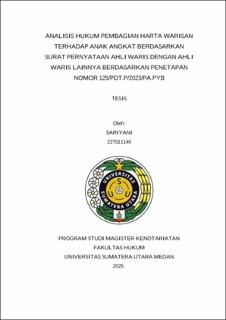| dc.description.abstract | This study analyzes the legal standing of adopted children in the distribution of inheritance based on the Surat Pernyataan Ahli Waris (SPAW Heirs Statement Letter), and compares it with heirs determined through the Religious Court Decision No. 125/Pdt.P/2023/PA.Pyb. The research addresses the legal status of adopted children and biological siblings as heirs from the perspective of Islamic inheritance law and Indonesian positive law, the evidentiary strength of SPAW in inheritance proceedings, and the legal implications arising from the use of SPAW in the distribution of inheritance assets.
This research employs a normative juridical approach, using data collection techniques including literature review, documentation, and in-depth interviews with relevant parties.
The findings indicate that under Islamic inheritance law, adopted children do not automatically have inheritance rights due to the absence of a bloodline (nasab). However, they may receive inheritance through wasiat wajibah (compulsory will) as a form of legal protection. Meanwhile, the biological sibling of the deceased may inherit in the absence of direct descendants or other primary heirs. In the case study, the SPAW issued by the local sub-district office and acknowledged by the sub-district head holds less legal authority compared to a Religious Court determination, which is formally binding and juridically stronger. When the two instruments conflict as in the case between RAL (the adopted child) and KA (the biological sibling)-legal uncertainty arises, delaying the execution of inheritance rights, particularly over a building unit that has yet to be transferred.
The study concludes that although SPAW is commonly used in practice to identify heirs, it cannot serve as the sole legal basis in the event of a dispute, especially when inconsistent with a court ruling. The disparity between SPAW and Religious Court determinations highlights the need for clearer regulations concerning the legal recognition of heir status- particularly that of adopted children within the national legal system. To ensure justice and legal certainty, it is crucial for parties to pursue formal legal processes and to consider drafting a wasiat wajibah for adopted children to prevent future legal conflicts.
Keywords: Adopted child, heir, Surat Pernyataan Ahli Waris (SPAW), Islamic inheritance law, Religious Court determination, legal justice, wasiat wajibah. | en_US |


